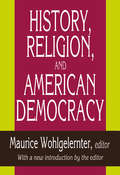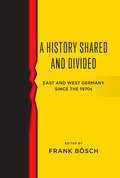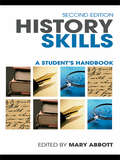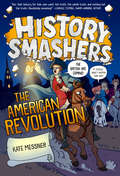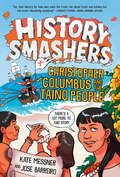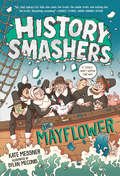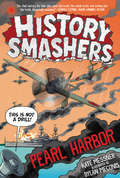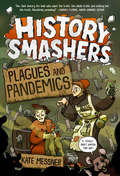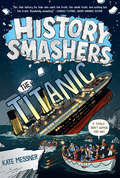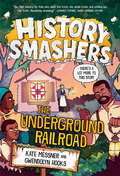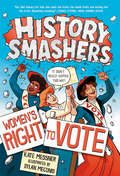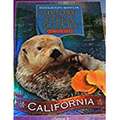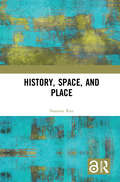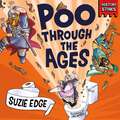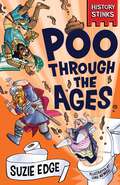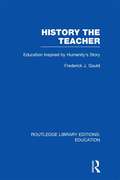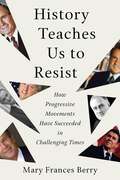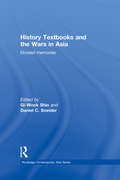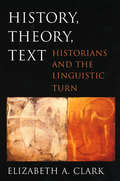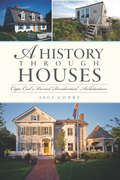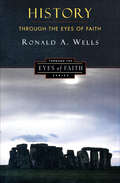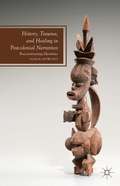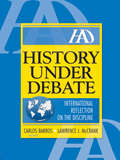- Table View
- List View
History, Religion, and American Democracy
by Maurice WohlgelernterHistory, Religion, and American Democracy provides a fundamental review of four major themes: naturalism and supernaturalism in an American context; issues in the history of Judaism; American social philosophy; and the teaching and learning of democratic ideals in a pluralistic postmodern environment. This book provides a naturalistic context for the deep analysis of religious, theological, as well as social and political themes.
A History Shared and Divided: East and West Germany since the 1970s
by Frank B�schBy and large, the histories of East and West Germany have been studied in relative isolation. And yet, for all their differences, the historical trajectories of both nations were interrelated in complex ways, shaped by economic crises, social and cultural changes, protest movements, and other phenomena so diffuse that they could hardly be contained by the Iron Curtain. Accordingly, A History Shared and Divided offers a collective portrait of the two Germanies that is both broad and deep. It brings together comprehensive thematic surveys by specialists in social history, media, education, the environment, and similar topics to assemble a monumental account of both nations from the crises of the 1970s to-and beyond-the reunification era.
History Skills: A Student's Handbook
by Mary AbbottDegree-level history is characterized not only by knowledge and understanding of the human past, but by a battery of skills and qualities which are as directly applicable to employment as to professional postgraduate training or academic research. History Skills gives frank and practical help to students throughout their university course with advice on: research methods taking notes participating in class coursework examinations the dissertation. Designed as a guide to success, the book helps to develop the critical skills that students need to get the most out of their course. This second edition has been thoroughly updated to take into account digital resources and the benefits and risks associated with online research. New chapters on the first-year experience and employability help students to adjust to the way history is taught at university and explore the opportunities available to them after graduating. Offering an unrivalled ‘insider’s view’ of what it takes to succeed, History Skills provides the comprehensive toolkit for all history students.
History Smashers: The American Revolution (History Smashers)
by Kate MessnerMyths! Lies! Secrets! Uncover the hidden truth behind the Revolutionary War with beloved educator/author Kate Messner. The fun mix of sidebars, illustrations, photos, and graphic panels make this perfect for fans of I Survived! and Nathan Hale's Hazardous Tales.On April 18, 1775, Paul Revere rode through Lexington and Concord, Massachusetts, shouting, "The British are coming!" to start the American Revolution.RIGHT?WRONG! Paul Revere made it to Lexington, but before he could complete his mission, he was captured!The truth is, dozens of Patriots rode around warning people about the Redcoats' plans that night. It was actually a man named Samuel Prescott who succeeded, alerting townspeople in Lexington and then moving on to Concord. But the Revolutionary War didn't officially start for more than a year after Prescott's ride. No joke.Discover the nonfiction series that smashes everything you thought you knew about history. Don't miss History Smashers: The Mayflower, Women's Right to Vote, Pearl Harbor, and Titanic.
History Smashers: Christopher Columbus and the Taino People (History Smashers #8)
by Kate Messner Jose BarreiroMyths! Lies! Secrets! Uncover the hidden truth about Christopher Columbus, and learn all about the Taino people. Perfect for fans of the I Survived books and Nathan Hale's Hazardous Tales.In 1492, Christopher Columbus sailed across the ocean and discovered America. Right? WRONG! Columbus never actually set foot in what is now the United States. His voyages took him to islands in the Caribbean and along the coast of South America. The truth is, when Columbus first arrived, Indigenous peoples, including the Taino, had been living there for thousands of years, raising their families, running their societies, and trading with their neighbors. He didn&’t &“discover&” the lands at all! And his name? Not even really Christopher Columbus! Cowritten by bestselling author Kate Messner and our country&’s premier Taino scholar, this fascinating addition to the series is the one that teachers have been asking for and that kids need to read.Discover the nonfiction series that demolishes everything you thought you knew about history. Don&’t miss History Smashers: The Mayflower, Women's Right to Vote, and Pearl Harbor.
History Smashers: The Mayflower (History Smashers)
by Kate MessnerMyths! Lies! Secrets! Smash the stories behind famous moments in history and expose the hidden truth. Perfect for fans of I Survived and Nathan Hale's Hazardous Tales.In 1620, the Pilgrims landed at Plymouth Rock and made friends with Wampanoag people who gave them corn. RIGHT? WRONG! It was months before the Pilgrims met any Wampanoag people, and nobody gave anybody corn that day.Did you know that the pilgrims didn't go straight from England to Plymouth? No, they made a stop along the way--and almost stayed forever! Did you know there was a second ship, called the Speedwell, that was too leaky to make the trip? No joke. And just wait until you learn the truth about Plymouth Rock.Through illustrations, graphic panels, photographs, sidebars, and more, acclaimed author Kate Messner smashes history by exploring the little-known details behind the legends of the Mayflower and the first Thanksgiving. "Kate Messner serves up fun, fast history for kids who want the truth, the whole truth, and nothing but the truth. Absolutely smashing!" --Candace Fleming, award-winning authorDon't miss History Smashers: Women's Right to Vote!
History Smashers: Pearl Harbor (History Smashers)
by Kate MessnerMyths! Lies! Secrets! Uncover the hidden truth behind the infamous Pearl Harbor attack with beloved educator/author Kate Messner. The fun mix of sidebars, illustrations, photos, and graphic panels make this perfect for fans of I Survived! and Nathan Hale's Hazardous Tales.On December 7, 1941, the Japanese launched a completely unpredictable attack on the U.S. Navy base at Pearl Harbor, Hawaii. Right? Well, that's not quite the real deal. Some military experts had suggested that Pearl Harbor was a likely target. There were other warning signs, too, but nobody paid much attention. From the first wave of the Japanese bombers to the United States' internment of thousands of Japanese Americans, acclaimed author Kate Messner smashes history by exploring the little-known truths behind the story of Pearl Harbor and its aftermath.Don't miss History Smashers: The Mayflower and Women's Right to Vote
History Smashers: Plagues and Pandemics (History Smashers)
by Kate MessnerMyths! Lies! Secrets! Uncover the hidden truth about history's pandemics, from the Black Death to COVID-19. Perfect for fans of I Survived! and Nathan Hale's Hazardous Tales.During the Black Death in the 14th century, plague doctors wore creepy beaked masks filled with herbs. RIGHT?WRONG! Those masks were from a plague outbreak centuries later--and most doctors never wore anything like that at all! With a mix of sidebars, illustrations, photos, and graphic panels, acclaimed author Kate Messner delivers the whole truth about diseases like the bubonic plague, cholera, smallpox, tuberculosis, polio, influenza, and COVID-19.Discover the nonfiction series that smashes everything you thought you knew about history! Don't miss History Smashers: The Mayflower, Women's Right to Vote, Pearl Harbor, Titanic, and American Revolution.
History Smashers: The Titanic (History Smashers)
by Kate MessnerMyths! Lies! Secrets! Uncover the hidden truth behind the sinking of the Titanic with beloved educator/author Kate Messner. The fun mix of sidebars, illustrations, photos, and graphic panels make this perfect for fans of I Survived! and Nathan Hale's Hazardous Tales.On April 15, 1912 an "unsinkable" ship called the Titanic unexpectedly hit an iceberg and sank to the bottom of the North Atlantic. Right?Wrong! Nobody was really talking about the Titanic being unsinkable until after it sank.The truth is, four different ships wired the Titanic to report icebergs and field ice in the area. But the Titanic never slowed down. In fact, when the Californian warned that it was trapped in ice, the Titanic's wireless operator was so busy sending outgoing messages that he replied, "Shut up!" No joke.Discover the nonfiction series that demolishes everything you thought you knew about history.Don't miss History Smashers: The Mayflower, Women's Right to Vote, and Pearl Harbor.
History Smashers: The Underground Railroad (History Smashers #7)
by Kate Messner Gwendolyn HooksMyths! Lies! Secrets! Uncover the hidden truth about the Underground Railroad and Black Americans' struggle for freedom. Perfect for fans of I Survived! and Nathan Hale's Hazardous Tales.Before the Civil War, there was a crack team of abolitionists who used quilts and signal lanterns to guide enslaved people to freedom. RIGHT? WRONG! The truth is, the Underground Railroad wasn't very organized, and most freedom seekers were on their own. With a mix of sidebars, illustrations, photos, and graphic panels, acclaimed author Kate Messner and coauthor and Brown Bookshelf contributor Gwendolyn Hooks deliver the whole truth about the Underground Railroad.Discover the nonfiction series that smashes everything you thought you knew about history!
History Smashers: Women's Right to Vote (History Smashers)
by Kate MessnerMyths! Lies! Secrets! Smash the stories behind famous moments in history and expose the hidden truth. Perfect for fans of I Survived and Nathan Hale's Hazardous Tales.In 1920, Susan B. Anthony passed a law that gave voting rights to women in the United States. RIGHT?WRONG! Susan B. Anthony wasn't even alive when the Nineteeth Amendment was ratified. Plus, it takes a lot more than one person to amend the constitution.Did you know that when women's rights activists picketed President Wilson to get his support for voting rights, some men beat them up, tore down their banners, and stole from them? And then it was the women who got arrested! No joke.Through illustrations, graphic panels, photographs, sidebars, and more, acclaimed author Kate Messner smashes history by exploring the little-known details behind the fight for women's suffrage.Don't miss History Smashers: The Mayflower!
History Social Science: Communities (California Edition)
by Herman J. Viola Sarah Witham Bednarz Carlos E. CortesThis book is a research-based curriculum that focuses on developing students' conceptual understanding and skills through step-by-step instruction.
History Solved Paper I Competitive Exam
by Indic TrustThis is a compilation of questions answer of Civil Service Examination History Solved Paper I.
History, Space and Place
by Susanne RauSpaces, too, have a history. And history always takes place in spaces. But what do historians mean when they use the word "spaces"? And how can spaces be historically investigated? Susanne Rau provides a survey of the history of Western concepts of space, opens up interdisciplinary approaches to the phenomenon of space in fields ranging from physics and geography to philosophy and sociology, and explains how historical spatial analysis can be methodologically and conceptually conceived and carried out in practice. The case studies presented in the book come from the fields of urban history, the history of trade, and global history including the history of cartography, but its analysis is equally relevant to other fields of inquiry. This book offers the first comprehensive introduction to the theory and methodology of historical spatial analysis.
History Stinks!: Poo Through the Ages (History Stinks!)
by Suzie EdgeWhat's that smell? It's HISTORY - and it STINKS!Did you know that you can discover loads about history just from the loo? Or piles about the past just from a poo? If not, then get ready to discover everything from Henry VIII's dodgy diet and poo-tastic Roman plumbing, to the stinky secrets of Victorian sewers and how life, death and everything in between can hang on the humble number two.From Saxons and Tudors to Ancient Greece, the Indus Valley, Aztecs and beyond, Poo Through the Ages features mighty monarchs, bonkers battles, deadly diseases, fossilised faeces and poo, poo, poo. Packed with fascinating facts, hilarious illustrations and the smelliest stories from our pongy past, get ready to dive into the smelliest corners of history!
History Stinks!: Poo Through the Ages (History Stinks!)
by Suzie EdgeWhat's that smell? It's HISTORY - and it STINKS!Did you know that you can discover loads about history just from the loo? Or piles about the past just from a poo? If not, then get ready to discover everything from Henry VIII's dodgy diet and Aztec poop canoes to giant, fossilizsed Viking plops, poo-tastic Roman plumbing, the stinky secrets of Victorian sewers, smelly cesspits, medieval muck and more.From Saxons and Tudors to ancient Greece, the Indus Valley and beyond, Poo Through the Ages features mighty monarchs, bonkers battles, deadly diseases, foul-smelling faeces and poo, poo, poo. Packed with fascinating facts, hilarious illustrations and the smelliest stories from our pongy past, get ready to dive into the smelliest corners of history!
History The Teacher: Education Inspired by Humanity's Story (Routledge Library Editions: Education)
by Frederick J GouldOrganized chronologically this volume examines education in England in the early twentieth century by discussing education through the ages, from pre-history to 1919. The author’s proposals were radical at the time of original education, although they embrace concepts which are now taken for granted in schools: that education of the "whole person" is vital; that the arts should enjoy equal prominence with the sciences; that schools are communities and that the educational experience will be richer for individuals if they work as and for a community.
History Teaches Us to Resist: How Progressive Movements Have Succeeded in Challenging Times
by Mary Frances BerryHistorian and civil rights activist proves how progressive movements can flourish even in conservative times.Despair and mourning after the election of an antagonistic or polarizing president, such as Donald Trump, is part of the push-pull of American politics. But in this incisive book, historian Mary Frances Berry shows that resistance to presidential administrations has led to positive change and the defeat of outrageous proposals, even in challenging times. Noting that all presidents, including ones considered progressive, sometimes require massive organization to affect policy decisions, Berry cites Indigenous peoples' protests against the Dakota pipeline during Barack Obama's administration as a modern example of successful resistance built on earlier actions.Beginning with Franklin D. Roosevelt, Berry discusses that president's refusal to prevent race discrimination in the defense industry during World War II and the subsequent March on Washington movement. She analyzes Lyndon Johnson, the war in Vietnam, and the antiwar movement and then examines Ronald Reagan's two terms, which offer stories of opposition to reactionary policies, such as ignoring the AIDS crisis and retreating on racial progress, to show how resistance can succeed.The prochoice protests during the George H. W. Bush administration and the opposition to Bill Clinton's "Don't Ask, Don't Tell" policy, as well as his budget cuts and welfare reform, are also discussed, as are protests against the war in Iraq and the Patriot Act during George W. Bush's presidency. Throughout these varied examples, Berry underscores that even when resistance doesn't achieve all the goals of a particular movement, it often plants a seed that comes to fruition later.Berry also shares experiences from her six decades as an activist in various movements, including protesting the Vietnam War and advocating for the Free South Africa and civil rights movements, which provides an additional layer of insight from someone who was there. And as a result of having served in five presidential administrations, Berry brings an insider's knowledge of government.History Teaches Us to Resist is an essential book for our times which attests to the power of resistance. It proves to us through myriad historical examples that protest is an essential ingredient of politics, and that progressive movements can and will flourish, even in perilous times.
History Textbooks and the Wars in Asia: Divided Memories (Routledge Contemporary Asia Series)
by Gi-Wook Shin Daniel C. SneiderOver the past fifteen years Northeast Asia has witnessed growing intraregional exchanges and interactions, especially in the realms of culture and economy. Still, the region cannot escape from the burden of history. This book examines the formation of historical memory in four Northeast Asian societies (China, Japan, South Korea, and Taiwan) and the United States focusing on the period from the beginning of the Sino-Japanese war in 1931 until the formal conclusion of the Pacific War with the San Francisco Peace Treaty of 1951. The contributors analyse the recent efforts of Korean, Japanese, and Chinese scholars to write a ‘common history’ of Northeast Asia and question the underlying motivations for their efforts and subsequent achievements. In doing so, they contend that the greatest obstacle to reconciliation in Northeast Asia lies in the existence of divided, and often conflicting, historical memories. The book argues that a more fruitful approach lies in understanding how historical memory has evolved in each country and been incorporated into respective master narratives. Through uncovering the existence of different master narratives, it is hoped, citizens will develop a more self-critical, self-reflective approach to their own history and that such an introspective effort has the potential to lay the foundation for greater self- and mutual understanding and eventual historical reconciliation in the region. This book will be essential reading for students and scholars of Asian history, Asian education and international relations in East Asia.
History, Theory, Text: Historians and the Linguistic Turn
by Elizabeth A. ClarkIn this work of sweeping erudition, one of our foremost historians of early Christianity considers a variety of theoretical critiques to examine the problems and opportunities posed by the ways in which history is written. Elizabeth Clark argues forcefully for a renewal of the study of premodern Western history through engagement with the kinds of critical methods that have transformed other humanities disciplines in recent decades. History, Theory, Text provides a user-friendly survey of crucial developments in nineteenth- and twentieth-century debates surrounding history, philosophy, and critical theory. Beginning with the "noble dream" of "history as it really was" in the works of Leopold von Ranke, Clark goes on to review Anglo-American philosophies of history, schools of twentieth-century historiography, structuralism, the debate over narrative history, the changing fate of the history of ideas, and the impact of interpretive anthropology and literary theory on current historical scholarship. In a concluding chapter she offers some practical case studies to illustrate how attending to theoretical considerations can illuminate the study of premodernity. Written with energy and clarity, History, Theory, Text is a clarion call to historians for richer and more imaginative use of contemporary theory.
A History Through Houses: Cape Cod's Varied Residential Architecture
by Jaci ConryThe rugged beauty of the Cape's landscape has been captured in writing since the days of Henry David Thoreau. Yet few mention the area's architecture, aside from references to the "Cape Cod houses," the basic cottages that the earliest settlers built. From Provincetown at the northern tip to the village of Woods Hole at the opposite end, the residential architecture of Cape Cod encompasses an extensive range of styles. Scattered among the charming Capes are stately Federals and Greek Revivals built for sea captains, detailed Carpenter Gothic cottages constructed by Methodist camp-goers and sprawling Victorian and Shingle-style summer mansions built during the Gilded Age. Journey with Cape Cod native Jaci Conry as she reveals the architectural influences of different eras on this timeless peninsula.
History Through the Eyes of Faith: Christian College Coalition Series
by Ronald A. WellsIntegrating faith with introductory Western history, this text provides a Christian perspective on the major epochs, issues, and events of Western Civilization. It details the role of the Greeks and Hebrews, Jesus in history, the Renaissance, and more.
History, Trauma, and Healing in Postcolonial Narratives: Reconstructing Identities (The Future of Minority Studies)
by Ogaga IfowodoWhat would it mean to read postcolonial writings under the prism of trauma? Ogaga Ifowodo tackles these questions through a psycho-social examination of the lingering impact of imperialist domination, resulting in a refreshing complement to the cultural-materialist studies that dominate the field.
History Under Debate: International Reflection on the Discipline
by Lawrence J Mc Crank Carlos BarrosExamine new trends in the writing of new history-and what they mean to information science! History has been devalued, causing a lack of career prospects for historians, a decrease in vocations to the history profession, and historical discontinuity between generations. History Under Debate: International Reflection on the Discipline is a recap of the crucial Second International Historia a Debate conference, held on July 17, 1999 in Santiago de Compostela. This book details the comparative critical perspectives on history, historians, their audiences, and the coming trends that will inevitably impact information science. The in-depth examination provides innovative approaches to historians as they redefine their discipline in relation to the global society of the new millennium while presenting invaluable insights for librarians, social scientists, and political scientists.History Under Debate: International Reflection on the Discipline examines how the writing of history in the twenty-first century is revitalized by international comparative historiography, thanks to new technologies and the multinational integration processes in economy, politics, culture, and academics. The first section discusses the Historia a Debate (HaD) Forum and Movement, detailing the need for change to restore history as a vital global subject in modern times. The remainder of the book consists of reflective and comparative views on the study of history and historiography as well as history in and about Spain and its relation to the rest of the world. The book explores new ways for moving the discipline beyond sources and source criticism alone to a different concept of the historical profession as a science with a human subject that discovers the past as people construct it. Included in this book is the English translation of the HaD Manifesto-a proposal designed to unify historians of the twenty-first century and ensure a new dawn for history, its writings, and its teachings.History Under Debate: International Reflection on the Discipline includes vital discussions on: "Linguistic Turn," Postmodernism, and Deconstruction gender studies and social history objectivity and subjectivity in historical interpretation multiple views of history from differing times and places history as criticism, literature, and reconstructionHistory Under Debate: International Reflection on the Discipline is an essential resource that teaches historians, librarians, social scientists, and humanists how to use cross-border development and new global historiographic networks to bring hope for a future in history.
